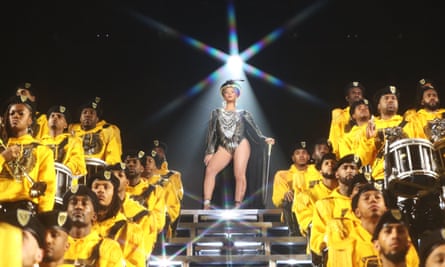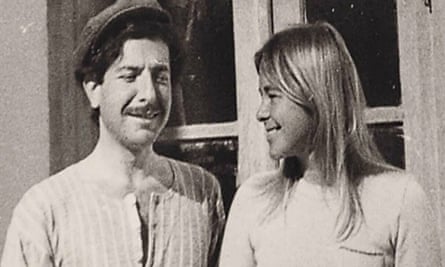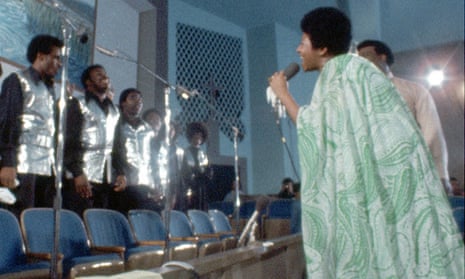When the rock star PJ Harvey let visitors to London’s Somerset House watch her recording her next album through the smoked panels of some one-way glass in 2015, it seemed a rare chance to spy on a major talent at work. Spectators dutifully filed past the event, entitled Recording in Progress, while Harvey and her collaborators made music together.
But a glimpse like this into the backroom world inhabited by our favourite musicians is now not so unusual. In the past two years intimate, feature-length rockumentaries of every description have been falling off the production line each month, competing for cinema-goers’ attention.
According to May’s edition of Billboard magazine, 11 new films about mainstream musicians, either documentaries or biopics, were all due out in cinemas over the next year, with many more niche productions lined up for music festivals or going out on streaming services. Last month Netflix brought us Martin Scorsese’s Rolling Thunder Revue, charting Bob Dylan’s mid-1970s tour, while just the month before critics were praising Amazing Grace, the late Sydney Pollack and Alan Elliot’s long-awaited film treatment of Aretha Franklin’s 1972 gospel session in a Los Angeles church. Out later this month is Nick Broomfield’s Marianne & Leonard: Words of Love, a documentary about the influential romance between Leonard Cohen and Marianne Ihlen. And for those PJ Harvey fans who did not make it to her Somerset House installation, Polly’s creative processes have also been committed to film by her long-time associate Seamus Murphy in A Dog Called Money, out in Britain in November.
The reason for the sudden glut is not only that documentary makers have been inspired by the surprise success of documentaries such as 2012’s Searching For Sugar Man, or Asif Kapadia’s Amy in 2015.
What investors have also noticed is the great power of these films to promote a music label’s back catalogue. Gennaro Castaldo, of the record label trade association the British Phonographic Industry, is clear about the potential value. “A compelling synergy exists between movies and music.
“With a slew of highly anticipated music documentaries either out, or due for release soon, fans can get close to the icons they love, from Led Zeppelin and Leonard Cohen to Beyoncé and PJ Harvey, so we can expect another surge in sales and streams.”

In response to predicted appetites, the record company BMG founded its own film department five years ago and has since financed two films, Echo in the Canyon, a documentary about the Laurel Canyon music scene in California, and David Crosby: Remember My Name, out in America last week. Music documentaries, just like music biopics and musicals, now have a proven ability to boost sales. The other factor making these film projects such attractive commercial prospects is the ageing profile of the potential audience. Fans in their 40s and 50s have long and fond musical memories, and are also more likely to have the cash to indulge their interests.
For film critic Nick James, former editor of Sight & Sound, a documentary strong on sentiment is not always a winner. More important is a fresh perspective. “I prefer a documentary to a rock biopic anyday, but I’m wary of nostalgia,” James said this weekend. “Marianne & Leonard is heartfelt and honest, but it’s still to a degree in thrall to the ‘sexual revolution’ whose utter destructiveness it chronicles. Cohen comes out of it badly, but we probably need to see those feet of clay.”
Broomfield’s Leonard Cohen film will come close on the heels of the recent four-part documentary about rappers the Wu-Tang Clan, nominated for an Emmy last week, and of Homecoming, the Beyoncé concert film that premiered on Netflix in April. It also follows Ron Howard’s documentary about Luciano Pavarotti, the Italian tenor, and The Quiet One, Oliver Murray’s study of the Rolling Stones’ Bill Wyman. Already seen at American film festivals, this last includes clips from the hours of unseen videos and photographs the bassist has amassed.
Such an outpouring of cinematic reverence for music makers is unprecedented. Yet there are many more to come. Out next month is Inna De Yard, chronicling the world of the pioneers of reggae. And at the Cannes film festival in May news came out of a major new documentary about Led Zeppelin, to be told in the band members’ words. Other more unusual documentary projects under way include a look at the short life of the Australian pop star Michael Hutchence and an appreciation of the cult British musician (and antiquarian) Julian Cope.
Rolling Stone magazine, itself the subject of a recent documentary, has attempted to break down the crop of films into categories. But they are slippery critters. Some, like Julien Temple’s new film Ibiza: The Silent Movie, or the recent 50th anniversary appreciation of the Woodstock music festival, are attempts to set a cultural moment in its proper context.

Others, like Studio 54’s study of the 1970s disco scene, seem happier to luxuriate in the details of a forgotten boomtime.
Still others, such as Fyre, about the collapse of a much-hyped festival in the Bahamas in 2017, tell a journalistic story, while the simplest music documentaries, such as the upcoming Bring the Soul: The Movie, are pure fuel for yearning fans. This will be the third film from South Korean boy band BTS and it is out next month.
Perhaps the most satisfying are those documentaries that present a performer in the round and from some unexpected angles. Steven Loveridge’s 2018 documentary, Matangi/Maya/M.I.A, about the London rapper M.I.A, pulls off just such a feat. M.I.A, real name Mathangi “Maya” Arulpragasam, had been filming her own life since her teens and Loveridge uses her old footage, as well as some gripping backstage sequences from her controversial Super Bowl appearance with Madonna in 2012.
If record companies want to reach a wider, uninitiated audience, however, they tend to look towards fictionalised treatments of their stars. The hit films Mamma Mia, Rocketman and Bohemian Rhapsody have blazed a spectacular trail. Warner Music Group has certainly seen the light. Two years ago the firm hired the former MGM executive Charlie Cohen to head its TV and film division.
“The phenomenal success of recent biopics celebrating the work of Queen, Elton John and Abba underline just how fantastic a medium film is for music – culturally but also commercially in terms of the huge global reach it can provide at the cinema and then in the home,” said the BPI’s Castaldo. “Movies provide the perfect emotional context for a piece of music that help to enhance its power and to profoundly resonate with the audience.
“In the process, this can reawaken the public’s love of classic repertoire, or of a particular artist, and encourage the next generation of fans to discover music that is new to them.”
This is certainly true of the recent Mötley Crüe biopic, The Dirt, co-produced by Allen Kovac, the man who runs the US rock band’s label, Eleven Seven. Starring Douglas Booth, the film has sparked an unlikely interest in Mötley Crüe’s back catalogue, with streams of the band’s music jumping 300% in the two months following The Dirt’s release, according to Nielsen Music.
And the next fictionalised biopic to focus on a key moment in the British music? Well, look out for Ewen Bremner – playing Alan McGee of Creation Records in Creation Stories, the biopic now filming in Glasgow. With an explicit screenplay by Trainspotting author Irvine Welsh it is not going to be a whitewash.
McGee, who signed Oasis and the Jesus and Mary Chain among many other acts, will be portrayed as “fallible”, Bremner has said: “A lot of what he was doing, he was the guy who did everything wrong but it all went right, you know? He signed the bands that everyone else saw a hundred red flags around, and created these culturally important milestones in popular music.”

Comments (…)
Sign in or create your Guardian account to join the discussion